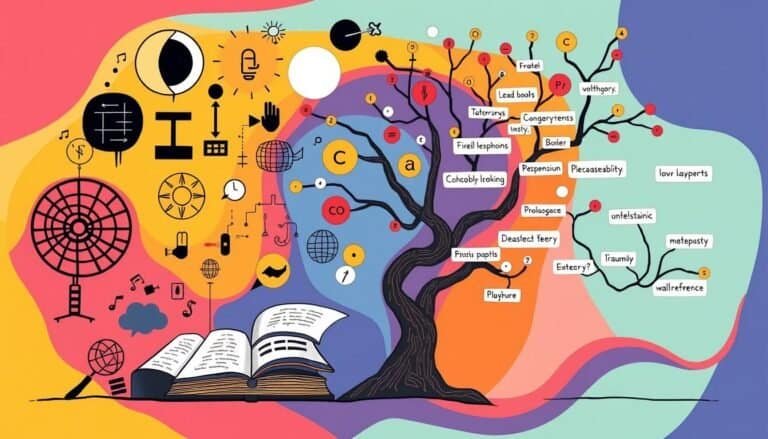Philosophical Perspectives on Death and Dying
What if our view of death is shaped by more than just feelings? This question opens up a deep dive into the world of philosophy and death. Thinkers throughout history have explored the big questions of mortality and what it means to exist. Their ideas make us question our beliefs about life and death, pushing us to think about our own mortality.
They show us how to live a meaningful life. From ancient times to now, philosophers have shared their thoughts on death. They’ve helped us see the deep meaning in life and death.
This article will look at how ancient and modern thinkers have viewed death. By exploring these ideas, we can better understand our own beliefs about life and death.
Key Takeaways
- Philosophy deeply influences how we see death and mortality.
- Socrates believed in the immortality of the soul, seeing life as a cycle.
- Søren Kierkegaard linked our death views to our life choices and beliefs.
- Arthur Schopenhauer saw death as a way to end suffering.
- René Descartes looked at death as the end of the body-soul interaction.
Introduction to Death Philosophy
Death philosophy covers a wide range of beliefs about the end of life. It makes us think deeply about what it means to die. Death is a part of being human, leading to deep thoughts on mortality. These thoughts have shaped how cultures view death over time.
Thinkers like Epicurus, Hume, and Nietzsche have shared their views on death. Their ideas are found in “Exploring the Philosophy of Death and Dying.” This book has 288 pages and 38 chapters. It offers insights into how cultures see death and the ethics of dying.
The book brings together the thoughts of famous philosophers. It talks about personal identity, euthanasia, and what death really means. Philosophers explore why death is bad and its effects on life. This helps us understand ourselves and our place in the world.
These ideas help us see death in a new light. They start a conversation about how we can view death in a healthy way. This helps us as individuals and as a society.
The Immortality of the Soul: Socratic Insights
Socrates, as seen in Plato’s dialogues, deeply explores the soul’s immortality. His thoughts offer a strong case for seeing death as a shift, not an end. This view shows how life and death are linked, and how seeking knowledge is eternal.
Understanding Socrates’ View on Death
In “Phaedo,” Socrates talks about death as the separation of body and soul. This idea is key to understanding the soul’s immortality. He believes true philosophers get ready for this separation by living wisely.
He presents four arguments in “Phaedo” for the soul’s immortality. These arguments show the soul lives on after the body dies. Socrates encourages living a virtuous life, as it affects the soul after death.
The Cycle of Life and the Soul’s Journey
The cycle of life sees the soul moving through death and rebirth, bringing back knowledge from past lives. Plato says death is just a step to a place of eternal truths. This idea brings comfort, suggesting our life choices shape our soul’s future.
Living right prepares the soul for its final judgment, affecting its afterlife home.
Cultural Attitudes Towards Death Across History
Death has been seen differently across history and cultures. It shapes how people see their own death and the rituals they follow. Looking at ancient and modern views on death shows big differences that still affect us today. This section will dive into how these beliefs have changed, especially in Western and Persian cultures.
Ancient vs. Modern Perspectives
In old times, death was seen as a change, not the end. Societies with roots in Zoroastrianism and early Islam had a calm view of death. They had rituals that honored the dead. But, the Middle Ages brought a scary view of death, as Philippe Aries noted. This change shows how society’s fear of death and the afterlife grew.
The Obsession with Death in the Middle Ages
The Middle Ages were marked by a deep focus on death, driven by religious beliefs. This was seen in art, literature, and death rituals, showing deep fears of judgment after death. In contrast, Persian culture had a mix of views on death, influenced by their history. Deathbed rituals and beliefs about judgment after death show deep connections across cultures. Persian poetry captures the deep feelings people have about life and death.
The change in how cultures view death shows a complex mix of historical beliefs. It leads to different ways of dealing with death and shows big differences between old and new times.
Existentialism and the Meaning of Mortality
Existentialist thought deeply explores death, especially through Søren Kierkegaard’s insights. He makes us think about the realness of our lives. He says knowing we will die changes how we live.
This part looks into existentialism and death, focusing on Kierkegaard’s ideas. It also talks about debates on mortality.
Søren Kierkegaard’s Take on Death
Kierkegaard sees death in a unique way. He believes accepting death is key to a real life. His death perspective says knowing we’re going to die makes us think about our choices.
He says society often hides the truth of death, leading to fake living. Kierkegaard wants us to give up these norms. He encourages us to find our own meaning in life, knowing we’ll die.
Debates Among Existentialist Thinkers
Other thinkers like Martin Heidegger and Karl Jaspers also discuss death. Heidegger shows how facing death helps us understand our existence. He urges us to truly accept our own death.
Jaspers adds to the debate by talking about death as more than just an end. He says facing death with dignity is important. This shows how our view of death affects how we live.
From Kierkegaard’s focus on the self to Heidegger’s deeper analysis, exploring death is key in existential thought.
| Philosopher | Key Concept | Perspective on Death |
|---|---|---|
| Søren Kierkegaard | Subjectivity | Embracing mortality for authentic living |
| Martin Heidegger | Being-toward-death | Confronting mortality shapes existence |
| Karl Jaspers | Dasein and Existenz | Accepting finitude with dignity |
Philosophical Perspectives on Death and Dying
Exploring philosophical views on death shows a deep history of thought. These ideas shape how we see our lives and how we tell stories about dying. Famous thinkers like Plato, Socrates, and Aristotle have greatly influenced this ongoing conversation.
Philosophers like Socrates believe death should not be feared. In his work “Phaedo,” he showed death as a peaceful end. This view encourages us to live fully and appreciate life more.
Debates on the harm thesis highlight the complex nature of life and death. They raise questions about existence and whether death ends life or continues it in another form. Epicurus and Stoics see death as the end of sensation, showing death’s place in life’s cycle.
Modern thinkers like Thomas Nagel say people fear death because of the experiences they miss out on. This makes us think about what a full life means. Yet, ancient thinkers like Zhuangzi see death as a natural part of life, something to be accepted, not mourned.
The deep discussions on death in philosophy reveal truths about life. They help us accept and think deeply about death. These views give us deep insights into death, leading to a more thoughtful life.
Ethical Considerations in Dying: A Philosophical Approach
Thinking about dying brings up big questions on the rightness of death and our choices. When we near the end, we wonder about assisted dying, euthanasia, and making our own choices. These topics need careful thought because they affect everyone involved.
The Morality of Death and Dying
Looking into death’s morality means we must think deeply. We focus a lot on the idea of autonomy, letting people decide how they want to end their lives. Healthcare workers and patients often face tough choices, especially when patients can’t say what they want. That’s where health care proxies step in, making sure the patient’s wishes are heard.
Debates Around Assisted Dying and Euthanasia
Debates on assisted dying show different views in families and healthcare. Family members of the dying face tough decisions that affect them too. We must think about what’s best for the patient, balancing helping them with not making them suffer longer. Talking about end-of-life care that focuses on comfort and quality of life is key. It follows ethical principles, as Luigi Mortari explains.
Talking about death and assisted dying gives us a chance to think deeply and understand each other better. The choices we make at the end of life tell a complex story. They show the true meaning of care, a bond filled with purpose and empathy. It’s all about respecting the dignity and wishes of those at the end.
Exploring the Philosophy of Afterlife: Different Beliefs
The philosophy of afterlife covers many beliefs across cultures and individuals. These beliefs show how different ideas shape our views on death and how we feel about it. By looking at religious and secular beliefs, we see how they affect how we deal with loss.
Comparing Religious and Secular Views
Religious beliefs often include an afterlife, giving people a way to understand life after death. Faiths like Christianity, Islam, and Buddhism have their own views on what comes next. Many find comfort in believing in a Heaven or reincarnation, giving them hope and meaning.
Secular beliefs, however, might be more skeptical. Thinkers like Epictetus believe death is the end, and fearing it is pointless. Others, like Singer and Wielenberg, suggest focusing on now, as our actions matter more than their future effects. This shows how beliefs shape our views and feelings about death.
Impacts of Afterlife Beliefs on Coping with Death
Beliefs about the afterlife affect how people deal with death. For the religious, stories of being reunited with loved ones or divine judgment help them cope with grief. This belief in an afterlife helps them stay strong, keeping hope during mourning.
Those without religious beliefs might see death differently, focusing on what they leave behind. Nagel believes our actions don’t matter forever, but their immediate effects do. Everyone’s view of death and how they cope with it can vary greatly.
| Aspect | Religious Views on Death | Secular Beliefs About Afterlife |
|---|---|---|
| Concept of Afterlife | Existence beyond physical life (e.g., Heaven, reincarnation) | No existence after life; permanent ceasing of being |
| Coping Mechanism | Hope through spiritual narratives | Pragmatic focus on current life and legacies |
| Philosophical Insights | Offers comfort through doctrines and faith | Emphasizes present actions’ significance over eternal consequences |
| Examples of Thinkers | Nietzsche, Epicurus | Epictetus, Singer, Wielenberg, Nagel |
Spiritual Beliefs About Death Across Cultures
Exploring spiritual beliefs about death shows us the deep cultural rituals that help us deal with loss. Different societies have their own views on death, showing how important these rituals are. These customs offer comfort and help with healing during grief.
Rituals and Practices in Different Cultures
Death rituals often mirror beliefs about the afterlife and ongoing existence. Here are some practices from around the world:
- HinduismIn Hindu families, a 13-day mourning ritual supports relatives, emphasizing the importance of community in coping with loss through spirituality.
- Buddhism: In Tibet, a 49-day mourning period follows a funeral, allowing for collective grieving and spiritual reflection.
- Italy: Temporary refrigerated coffins are provided for mourners to pay their respects before burial, showing the cultural value of saying goodbye.
- Islam: Islamic tradition mandates immediate burial, reflecting the belief in resurrection and the urgency of honoring the deceased.
- The Māori of New Zealand: The tangihanga mourning process involves communal reminiscing and elaborate rituals to send off the spirit, strengthening community bonds during grief.
The Role of Spirituality in Coping with Loss
Spirituality is key in helping us cope with loss, offering emotional support and a way to understand death. The variety of spiritual beliefs about death shows different ways to deal with loss:
| Culture | Mourning Period | Spiritual Beliefs |
|---|---|---|
| Hindu | 13 Days | Reincarnation |
| Buddhist | 49 Days | Life Cycle |
| Māori | Varies | Spiritual Journey |
| Islamic | Immediate | Resurrection |
| Jewish | 24 Hours | Focus on Life |
Seeing how cultures handle death gives us insight into the human experience. These rituals not only honor the dead but also help the living connect with their spirituality. They show deep community ties and beliefs about life after death.
Mortality Reflections: Insights from Influential Philosophers
Philosophers have given us deep thoughts on life and death. René Descartes and Arthur Schopenhauer share different views. Descartes talks about the mind and body being separate. Schopenhauer sees life as hard and death as a way to end suffering.
Ideas from Descartes on Body and Soul
René Descartes looked into the body-soul dualism. He believed the mind and body are not the same thing. The mind is not physical, but it thinks and feels.
His ideas say our thoughts and feelings are not just our bodies. They show that being alive is more than just being a body.
Schopenhauer and the Pessimistic View on Life and Death
Arthur Schopenhauer had a different view. He thought life is full of suffering. He saw death as a way to stop the pain of living.
Schopenhauer’s thoughts make us think deeply about death. They make us see how hard life can be and how death is sure to come.
| Philosopher | Main Focus | View on Mortality |
|---|---|---|
| René Descartes | Body-soul dualism | Consciousness is distinct from the physical body |
| Arthur Schopenhauer | Pessimism | Death as a resolution to suffering |
Conclusion
Exploring philosophical views on death and dying shows us deep truths about our lives. We’ve seen how Stoicism sees life as short and fleeting. We’ve also looked at how near-death experiences change our view of mortality.
These ideas help us have healthier thoughts about death. By understanding death is sure to happen, we focus on what’s important. This gives us a new purpose in life.
Death can be seen as a blank wall, a door to another world, or just part of life. These views push us to accept and appreciate our life journey.
The philosophy of death teaches us that everyone is equal, no matter their knowledge. By learning from these thoughts on dying, we can face our own death better. This leads to a more meaningful life.
Knowing death is always with us, we should live fully. We should also make strong connections with ourselves and others.
Source Links
- Philosophical, Psychological & Spiritual Perspectives on Death & Dying
- The Philosophy of Death: 5 Mind-Blowing Views
- Exploring the Philosophy of Death and Dying: Classical and Contemporary Perspectives
- Philosophy and Death – Broadview Press
- Plato: Phaedo | Internet Encyclopedia of Philosophy
- What did Plato say about death? – WisdomShort.com
- Philosophy and Death
- History of attitudes toward death: a comparative study between Persian and western cultures
- How Death Imitates Life: Cultural Influences on Conceptions of Death and Dying
- Historical Perspectives on Attitudes concerning Death and Dying
- Death, Faith & Existentialism | Issue 27
- Meaning and Mortality in Kierkegaard and Heidegger: Origins of the Existential Philosophy of Death
- A Philosophical Perspective on Death
- Death
- Nerdfighteria Wiki – Perspectives on Death: Crash Course Philosophy #17
- Ethical considerations at the end-of-life care
- Ethical dilemmas at the end of life: a reflection from the Philosophical Perspective of Luigina Mortari
- Afterlife
- Exploring the Philosophy of Death and Dying: Classical and Contemporary Perspectives
- Is There Life (or Anything) After Death?
- Death – Cultural, philosophical and religious aspects
- Death and dying: how different cultures deal with grief and mourning
- What Experts Told Me About What Happens After Death Forever Changed My Life
- Reflections on Death in Philosophical/Existential Context – Society
- Exploring Philosophical Perspectives on Death and Meaning – Civilization Chronicles
- The Philosophy of Death — The Philosophy of Everything
- Death and Its Concept – The Philosophers’ Magazine







